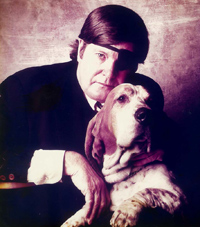
Warren Hinckle, best known for co-creating Gonzo Journalism with Hunter S. Thompson, died yesterday in his home in San Francisco. Described as pugnacious, swashbuckling, hard-drinking, and brilliant by all those that knew him, Warren Hinckle’s work as an editor and reporter has left an indelible mark on the field of journalism within the United States.
The Oral History Center is fortunate enough to have conducted an extensive oral history with Warren Hinckle, which resulted in 43 hours of recorded material. Interviewed by OHC historian, Lisa Rubens, Hinckle’s reflective oral history is an evocative and expansive account of the man behind Ramparts and Scanlan’s and a true testament to his spirit.
Raised in San Francisco’s Sunset District during the 1940s, Hinckle expressed an interest in journalism from a very early age. Hinckle notes, “Some people want to be fishermen when they grow up, some want to be cops, some want to be doctors. I always wanted to be a newspaper guy. […] What little money I had when I was a kid, I would always go down to the out of town newspaper stores and buy papers and look at them and went to second hand bookstores and bought books, back even before I got into high school.”
His early interest in newspapers would transform into a long and notable career that would push the limits of what constitutes journalism and, in so doing, would capture the frenetic essence of the 1960s, 70s and 80s. As a writer for the SF Chronicle and Examiner, Hinckle became well known in the Bay Area for his investigative journalism and innate ability to turn things upside down and push people’s buttons. In one of his interviews with Rubens, Hinckle recalls, almost fondly, his sustained criticism of Dianne Feinstein: “I have a long history, in any newspaper I’ve written for, to give Dianne a few jabs here or there. It started out when she— which I thought was great, what spunk it showed—dumped a drink on my head one night at the Officers’ Club.”
Hinckle’s work, however, was not merely provocative for the sake of provocation. Assuming the role of executive editor at Ramparts in 1964, Hinckle transformed the small-circulation Catholic magazine into a mass-circulation publication that was openly critical of the Vietnam War and unapologetic of its inclusion of Che Guevara and Eldrige Cleaver’s writings. Although short-lived, Ramparts was a pivotal product of its times, which has subsequently been lauded as the precursor to publications, such as Rolling Stone, Mother Jones, and Slate. After Ramparts, Hinckle would go on to create Scanlan’s, which though also short lived and mired in financial issues, would give birth to Gonzo Journalism with Hunter S. Thompson’s irreverent 1970 article, “The Kentucky Derby is Decadent & Depraved.”
It goes without saying that Warren Hinckle’s many contributions and even failures forever altered and reimagined what journalism could look like, sound like and for whom it was being created. The Oral History Center invites you to look back and learn about Warren Hinckle—a true iconoclast—from the man himself. So, pour yourself a Scotch, neat, and immerse yourself in this remarkable oral history.